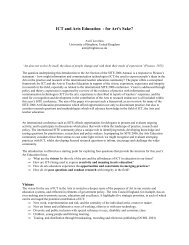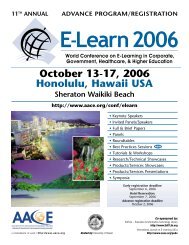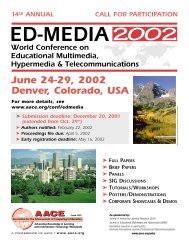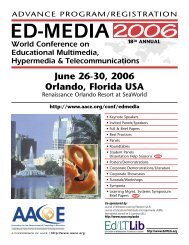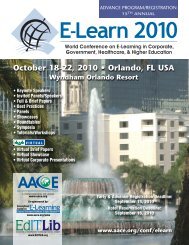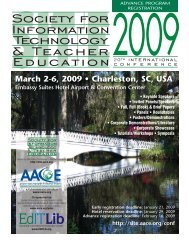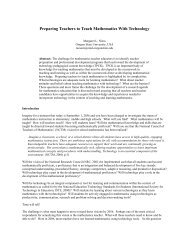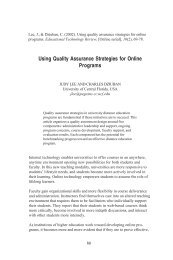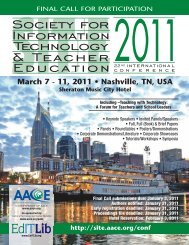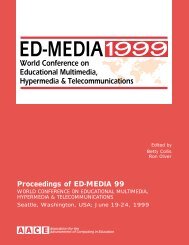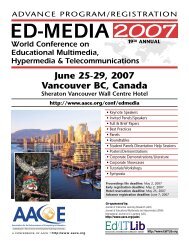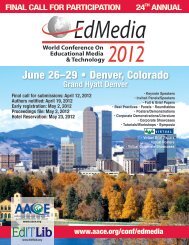ED-MEDIA 1999 Proceedings Book - Association for the ...
ED-MEDIA 1999 Proceedings Book - Association for the ...
ED-MEDIA 1999 Proceedings Book - Association for the ...
You also want an ePaper? Increase the reach of your titles
YUMPU automatically turns print PDFs into web optimized ePapers that Google loves.
* Changes in educational paradigms<br />
* The need <strong>for</strong> improved communications<br />
* Workplace demands<br />
* Legislative requirements<br />
* A need <strong>for</strong> equity<br />
* Technological change and obsolescence<br />
Implementing <strong>the</strong> requirement did not relieve <strong>the</strong> university of all responsibility <strong>for</strong> in<strong>for</strong>mation technology<br />
access. To <strong>the</strong> contrary, assured access is a partnership, wherein <strong>the</strong> student provides basic access, while<br />
<strong>the</strong> campus provides not only infrastructure support, but also specialized labs with high-end machines <strong>for</strong><br />
applications beyond <strong>the</strong> capacity of student owned machines.<br />
From a business perspective, we treat student computers just like textbooks. Unlike o<strong>the</strong>r universities, we<br />
do not require students to purchase a notebook computer from a specific vendor. The institution makes a<br />
recommendation, but it is up to <strong>the</strong> student to make <strong>the</strong> business decisions associated with <strong>the</strong> purchase, i.e.<br />
exactly what to obtain, where to buy it, and indeed whe<strong>the</strong>r to buy it. Just as with textbooks, we recognize<br />
that while instructors can expect that students will have access to <strong>the</strong> required computer, <strong>the</strong>re is no<br />
en<strong>for</strong>cement associated with <strong>the</strong> recommendation. Sonoma has no "computer police"!<br />
Our students can:<br />
• Purchase <strong>the</strong> computer outright: Vendors have offered computers at specially discounted prices, and<br />
<strong>the</strong> campus bookstore has limited its profit margins on computer sales.<br />
• Obtain a loan, and use it to purchase a computer: A local credit union offers loan programs that are<br />
tailored to student needs.<br />
• Use financial aid: Financial aid facilitates <strong>the</strong> purchase of computers by a significant number of<br />
students.<br />
• Borrow a computer from a loan pool: Students who cannot af<strong>for</strong>d any of <strong>the</strong> options above are offered<br />
a yearlong loan of a computer from a pool of machines maintained <strong>for</strong> this purpose. To date, 180<br />
computers have been loaned to <strong>the</strong> most needy students.<br />
Our universal access program has elicited an extraordinary degree of enthusiasm and support from both<br />
employers and <strong>the</strong> media, based on <strong>the</strong> perception that it is highly relevant to <strong>the</strong> needs of our "customers" -<br />
both <strong>the</strong> students, and society at large. Indeed, in <strong>the</strong> business community, <strong>the</strong> program is seen as a move<br />
by <strong>the</strong> university away from <strong>the</strong> isolationism of <strong>the</strong> "ivory tower" towards recognition of <strong>the</strong> real needs of<br />
<strong>the</strong> outside world.<br />
Motivating and Facilitating Learning with IT at Wake Forest University<br />
Craig Runde, Wake Forest University<br />
The special challenge <strong>for</strong> a college or a university is to create an environment with <strong>the</strong> people, policies, and<br />
traditions that motivate and facilitate learning. In 1993, faculty, students and administrators of Wake Forest<br />
University began work on a blueprint to enrich <strong>the</strong> quality of undergraduate education at <strong>the</strong> institution,<br />
already nationally recognized as one of <strong>the</strong> finest private liberal arts universities in <strong>the</strong> country.<br />
Wake Forest University decided to create a ubiquitous computing environment where students, faculty, and<br />
staff members all had laptop computers and network access from on campus and remote access to <strong>the</strong><br />
campus network available via <strong>the</strong> IBM Global Network.<br />
The University sought to use technology to provide a more customized learning experience <strong>for</strong> students.<br />
This approach built on strength of providing an education that is both personal and individual. Be<strong>for</strong>e <strong>the</strong><br />
computer revolution, <strong>the</strong> way to personalize and customize education was to focus vast quantities of faculty<br />
time upon teaching and students. Although faculty time and attention is still <strong>the</strong> key to personalization, a<br />
student's education can now be customized through computer access.



